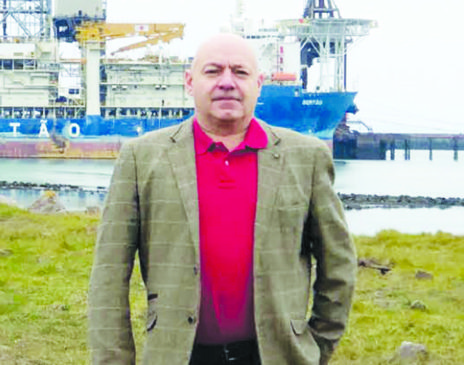…proposes production of domestic electricity

Evolve Trading and Investment, a welsh company, has set their sight on investment opportunities here in Guyana, with the aim of providing Low Sulphur Marine Oil to the marine industry.
This resource, the company said in a release, will be supplied in keeping with the International Convention for the Prevention of Pollution from Ships (MARPOL) as they seek to forge international relationships in the trade industry. Headquartered in the United Kingdom, they are “identifying a niche market by using their unique cutting-edge technology to create strategic global hubs”.
The company is one which provides training, jobs, electricity and water, along with the development of newer technologies to cure a number of challenges in various regions.
Senior Vice President of the company, George Karstein Irvine met with officials from both the Guyana and UK Governments to outline plans and provided reasons to enter the market, creating a strategic hub for the production and distribution of Low Sulphur Marine Fuel Oil (LMSFO). When completed, it would be the first of its kind in South America. Meanwhile, 50 megawatts of domestic electricity can also be generated.
“To this end, Evolve Trading and Investment has signalled an exclusive agreement with a 100 per cent owned local company, A&S Enterprise…The technology being proposed can also be used to create 50Mw of domestic electricity as well as copious amounts of fresh water which could be made available to the local national grid,” the company signalled.
A joint meeting will be facilitated in January 2020 between the partnering companies in this venture.
As Guyana prepares to step into the shoes of an oil-producing nation, the industries have since attracted a host of foreign investors.
Oil and gas companies throughout the world have discovered over seven billion barrels of oil equivalent for the year 2019, but of this amount, Guyana has the second most discoveries so far in the year.
This is according to Norwegian research company Rystad Energy, which compiled a report on all the discoveries of oil around the world and came up with a list of the top 10 countries. Russia is in the lead, with over 1.5 billion barrels of oil found in its Dinkov and Nyarmeyskoye oil fields.
So far, Esso Exploration and Production Guyana Limited (EEPGL, Exxon’s local subsidiary) has made 14 oil finds in the Stabroek block over 100 miles offshore Guyana, including four for this year.
Last year, the company made five discoveries. These discoveries have pushed the total estimated recoverable barrels of oil equivalent to over six billion. In addition, Exxon is moving ahead with its Liza Phase Two project, which will contain approximately 30 wells.
The Liza Destiny, Guyana’s first Floating Production Storage and Offloading (FPSO) vessel, arrived in Guyana’s waters at the end of August. The vessel will play a key role in oil production, scheduled to begin in the first quarter of next year.
Meanwhile, Tullow has made at least two oil finds in its Jethro and Joe wells. On September 16, the same day that ExxonMobil announced its 14th oil find, Tullow also revealed that it had made its second oil find in just a matter of weeks – the discovery of 14 metres of oil reservoirs at the Joe well.
However, the oil found by Tullow was found to be heavy crude which has a high sulphur content. Crude with high sulphur content is a variety of oil that is less economically viable than the light, sweet crudes found in the United States and Saudi Arabia, or even the oil found by ExxonMobil right offshore Guyana in the neighbouring Stabroek Block.
Both the Jethro and Joe wells were drilled in the Orinduik Block, which is located just a few kilometres from ExxonMobil’s discoveries. Despite the close proximity of the blocks, however, Exxon has not had the same issues with oil impurities.
In light of the latest analysis, Tullow said that it would weigh “the commercial viability of these discoveries considering the quality of the oil, alongside the high-quality reservoir sands and strong overpressure.”



